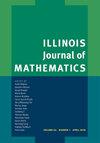无限图因子的Ramsey上密度
IF 0.7
Q3 MATHEMATICS
引用次数: 3
摘要
基于拉姆齐理论的上密度问题的研究是由埃尔德斯和加尔文于1993年发起的。在本文中,我们关注以下问题:给定一个固定的有限图$F$,$\lambda$的最大值是多少,使得$\mathbb{N}$上的完备图的每一个2-边着色都包含一个单色无限$F$因子,其顶点集的上密度至少为$\lambda$?在这里我们证明了这个问题的一个新的下界。对于$F$的一些选择,包括派系和奇数周期,这个新的上界是尖锐的,因为它与旧的上界相匹配。对于$F$是三角形的特殊情况,我们还给出了$1-\frac{1}{\sqrt{7}}=0.62203\dots$的显式下界,改进了先前3/5的最佳界。本文章由计算机程序翻译,如有差异,请以英文原文为准。
Ramsey upper density of infinite graph factors
The study of upper density problems on Ramsey theory was initiated by Erdős and Galvin in 1993. In this paper we are concerned with the following problem: given a fixed finite graph $F$, what is the largest value of $\lambda$ such that every 2-edge-coloring of the complete graph on $\mathbb{N}$ contains a monochromatic infinite $F$-factor whose vertex set has upper density at least $\lambda$?
Here we prove a new lower bound for this problem. For some choices of $F$, including cliques and odd cycles, this new bound is sharp, as it matches an older upper bound. For the particular case where $F$ is a triangle, we also give an explicit lower bound of $1-\frac{1}{\sqrt{7}}=0.62203\dots$, improving the previous best bound of 3/5.
求助全文
通过发布文献求助,成功后即可免费获取论文全文。
去求助
来源期刊
CiteScore
0.90
自引率
0.00%
发文量
18
期刊介绍:
IJM strives to publish high quality research papers in all areas of mainstream mathematics that are of interest to a substantial number of its readers.
IJM is published by Duke University Press on behalf of the Department of Mathematics at the University of Illinois at Urbana-Champaign.

 求助内容:
求助内容: 应助结果提醒方式:
应助结果提醒方式:


